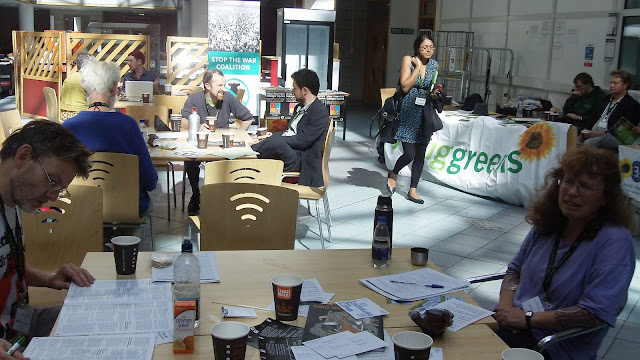 |
| Plenary session at Sheffield Hallam University |
My report of the Green Party Conference has been delayed by work, but my head is still full of ideas after having three great days in Sheffield. One of the best things about visiting any political conference is meeting up with fellow troublemakers. I met lots of people who I have been talking to online for ages, and it was really good to see all of them.
I arrived on Friday and departed on Sunday after a weekend of passionate debate and very stimulating fringe meetings. The fringe is always an important part of conference, where people come together to discuss ideas and ways forward. There is never really enough time to do much of the debate justice, often, speakers take up too much of the allotted time, and I'm afraid this was the case at conference this year. There were lots of excellent meetings but the two that stood out for me were the 'Living Wage' and 'Greens and Capitalism'.
 | ||
| Jean Lambert (right) speaking at the Living Wage fringe meeting |
At the latter fringe meeting there was a rousing speech by Derek Wall, who narrowly missed out on becoming Party Chair this year. The speakers, who also included Jonathan Essex and Jane Ennis, presented the meeting with a cogent criticism of the crisis of capitalism we are going through, in which ordinary people are being asked to pay twice for the failures of capitalism, first through the bank bailout, and now, through the sovereign debt crisis. The economic failures of neoliberalism are being compounded by the ongoing programme of privatisation and deregulation which is making all of us poorer.
In the main hall there were a number of important debates on policy and organisational issues. Motions on a moratorium for Shale gas extraction (fracking) and against an immigration cap were passed, as were motions to support One Million climate change Jobs and the Coalition of Resistance. There was a very lively and tough debate about the motion on delegate conferences. The debate was complicated by the fact that the motion presented conference with four options. In the end, conference went for Option 4, which was to re-consider the position when the party membership reaches 25,000. In my view, this was the right result. There are powerful arguments for a delegate conference e.g. delegates represent the views of their local party thus widening representation at conference, which means that more members have a say. But we are still a small party, many local parties don't have the resources to support delegates, and, in my view, as an experienced union steward who attended two Unison conferences and two NUT conferences, delegates tend to be the same people every year, activists who may represent the view of the branch committee, not necessarily the wider membership. I look forward to the time when we will debate this issue again at conference.
 | ||
| Relaxing at conference |
There were also a number of excellent emergency motions on; Legal Aid and Justice for All; Robin Hood Tax; Anti – ATOS; Nuclear Waste Disposal; NHS Listening Exercise; Bombardier - Rail jobs; English Riots; ; and the National Planning Policy Framework.
Overall, it was a great conference, with rousing speeches defending the NHS from Caroline Lucas and Adrian Ramsay which put the so-called Labour Party to shame and consolidated our position as the only mainstream party of the left in England and Wales.
1 comment:
Post a Comment